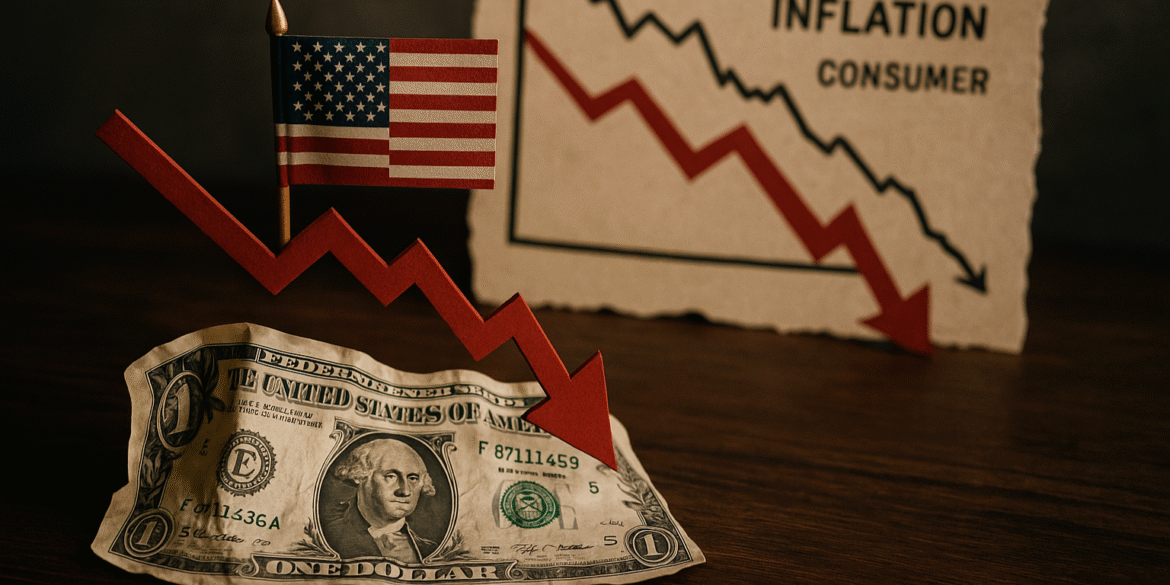The U.S. economy is facing an increasing sense of uncertainty, as inflation expectations climb and consumer confidence wanes. A combination of rising prices, persistent supply chain disruptions, and ongoing global trade tensions has created a volatile economic environment. The University of Michigan’s Consumer Sentiment Index, a closely watched gauge of household confidence, fell to 50.8 in May, marking its second-lowest level in history and underscoring mounting concerns about the future.
Inflation Expectations on the Rise
Inflation has been a persistent concern for U.S. consumers and businesses alike. The consumer price index (CPI) has been on an upward trajectory for the past year, largely driven by increased costs in energy, housing, and food. In April 2025, the annual inflation rate stood at 4.9%, well above the Federal Reserve’s 2% target. Though inflation has been moderating in recent months, many economists believe it will remain elevated in the near future due to a variety of factors.
According to the Federal Reserve, inflationary pressures are being exacerbated by ongoing global supply chain disruptions, which continue to hinder the smooth flow of goods and services. Additionally, global trade tensions, particularly between the U.S. and major economic partners like China and the European Union, have led to tariffs on various imports. While recent tariff agreements have provided some relief, experts caution that these measures have not fully addressed the underlying issues.
The Biden administration has made efforts to manage inflation by adjusting trade policies and attempting to reduce supply chain bottlenecks. However, trade conflicts, labor shortages, and geopolitical instability have all contributed to a situation where inflation expectations continue to rise.
Consumer Confidence Declines
The drop in the University of Michigan’s Consumer Sentiment Index in May is a clear reflection of the growing unease among American households. The index, which measures consumer confidence in the economy, fell to 50.8, down from 55.2 in April. This marks the second-lowest reading in the index’s history, trailing only the 50.0 recorded during the height of the COVID-19 pandemic in 2020.
Economists view this decline as a sign that consumers are becoming increasingly concerned about rising prices, economic instability, and the potential for a slowdown in economic growth. Many consumers are re-evaluating their purchasing habits, cutting back on discretionary spending, and focusing on essential items. This is particularly evident in sectors such as retail, hospitality, and travel, where demand has softened in recent months.
The primary driver behind the decline in consumer sentiment is the ongoing inflation crisis. With wages not keeping pace with rising prices, many Americans are finding it harder to make ends meet. Gasoline prices, in particular, have been a major source of concern. According to AAA, the average price for a gallon of regular gasoline in the U.S. reached $4.20 in May, up nearly 30% from the same time last year.
Federal Reserve’s Dilemma: Balancing Inflation and Employment
In response to rising inflation, the Federal Reserve has embarked on a series of interest rate hikes in an attempt to curb price growth. The central bank has raised its benchmark interest rate to 5.25% in May, the highest level in over 15 years. The goal of these rate hikes is to reduce consumer spending, cool down the housing market, and lower inflationary pressures.
However, there are concerns that these policies could have unintended consequences. Higher interest rates typically make borrowing more expensive, which could lead to a slowdown in business investment and job creation. This, in turn, could negatively impact the labor market and exacerbate existing unemployment concerns.
The Fed is also grappling with the complexities of the ongoing trade wars and tariffs. While the U.S. has reached some agreements to ease tariffs with certain countries, many economists argue that these trade tensions have led to increased costs for businesses, which are then passed on to consumers. As a result, inflation may remain stubbornly high, even in the face of higher interest rates and tightening monetary policies.
Tariffs and Their Impact on Inflation
Despite efforts to negotiate tariff agreements, global trade tensions remain a significant factor contributing to inflationary pressures. The Biden administration has been working to resolve trade disputes with key partners like China and the European Union, but these efforts have met with mixed success. In particular, tariffs on Chinese goods, which were imposed during the trade war under the Trump administration, are still in place, adding to the cost of consumer goods.
While the U.S. and China have held talks in recent months, there has been little progress on eliminating tariffs. According to a recent report from the U.S. Trade Representative, tariffs on Chinese imports cost American consumers an additional $1,200 per year on average. With little prospect for an imminent resolution to the trade war, experts warn that these tariffs will continue to contribute to inflationary pressures in the short term.
Economic Forecast: What Lies Ahead?
As the U.S. economy navigates these turbulent times, the outlook remains uncertain. The Federal Reserve’s interest rate hikes are expected to continue throughout the year, but their effectiveness in curbing inflation remains unclear. While some experts believe that inflation will gradually come down over the next few quarters, others argue that it could persist for the foreseeable future.
At the same time, rising consumer concerns could dampen economic growth in other areas. If the downward trend in consumer sentiment continues, it could lead to a slowdown in consumer spending, which is a significant driver of U.S. economic growth.
With these challenges in mind, Federal Reserve officials are closely monitoring economic data and may adjust their policies accordingly. Some analysts believe that more aggressive action may be necessary to prevent inflation from spiraling out of control. Others caution that overly tight monetary policies could tip the economy into a recession, further straining American households and businesses.
As the situation unfolds, one thing is clear: the U.S. economy is at a crossroads. The coming months will be critical in determining whether inflation can be tamed without causing lasting damage to economic growth and employment.

